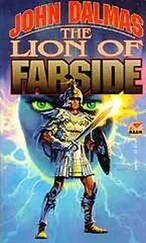John Dalmas - Return to Fanglith
Здесь есть возможность читать онлайн «John Dalmas - Return to Fanglith» весь текст электронной книги совершенно бесплатно (целиком полную версию без сокращений). В некоторых случаях можно слушать аудио, скачать через торрент в формате fb2 и присутствует краткое содержание. Жанр: Фэнтези, на английском языке. Описание произведения, (предисловие) а так же отзывы посетителей доступны на портале библиотеки ЛибКат.
- Название:Return to Fanglith
- Автор:
- Жанр:
- Год:неизвестен
- ISBN:нет данных
- Рейтинг книги:4 / 5. Голосов: 1
-
Избранное:Добавить в избранное
- Отзывы:
-
Ваша оценка:
- 80
- 1
- 2
- 3
- 4
- 5
Return to Fanglith: краткое содержание, описание и аннотация
Предлагаем к чтению аннотацию, описание, краткое содержание или предисловие (зависит от того, что написал сам автор книги «Return to Fanglith»). Если вы не нашли необходимую информацию о книге — напишите в комментариях, мы постараемся отыскать её.
Return to Fanglith — читать онлайн бесплатно полную книгу (весь текст) целиком
Ниже представлен текст книги, разбитый по страницам. Система сохранения места последней прочитанной страницы, позволяет с удобством читать онлайн бесплатно книгу «Return to Fanglith», без необходимости каждый раз заново искать на чём Вы остановились. Поставьте закладку, и сможете в любой момент перейти на страницу, на которой закончили чтение.
Интервал:
Закладка:
"Umh." He thought about that, frowning, then said something more to the Greek and walked away.
"What did he tell you?" I asked.
"He had planned to sell all of us, and the ship and horses, to Saracen merchants in Spain. But he says he cannot sell a Christian holy man, certainly not to the Saracens, so he will have to take you with him to his homeland."
Well, I thought, mark one up to being a holy monk. "He asked if I followed the way of Miklagard," I said. "Where or what is Miklagard?"
"These men are Varangians, Miklagard is their name for Byzantium."
Varangians? "What are Varangians?" I asked.
He shrugged. "They are barbarian mercenaries who come from the North. Some come on ships like this, across the Mediterranean. But mostly they come, or used to, across the Black Sea from the Rhos land. They pay no heed to kings, but bond themselves by oaths to whatever leaders they choose. Most of these men have been fighting for the Emperor, and are returning now to their homelands with the gold they have earned."
The Emperor. That would be the Byzantine emperor, I decided.
"And they plan to sell you?" I said. "Does that mean you'll be a slave?"
"Yes. But I am a skilled sailor. I will probably not be chained to a rowing bench or sent to the mines."
He didn't seem all that upset. Resigned was more like it.
Meanwhile Arno had gotten to his feet and stood by, taking it all in. Now he called out in what seemed to be the Norse language! It surprised heck out of me; I hadn't known he knew it. The captain, who was standing about thirty feet away in the bow, turned and stared at him, then said something back in Norse. Haltingly, Arno answered, and the captain came over with an interested expression. They talked for a couple of minutes, Arno often pausing as if groping for words. The captain reached out, squeezed Arno's arms and shoulders with big hands as if testing his muscles. Then he laughed, nodding, said something more, and drew Arno by an arm to the center of the long ship while calling in Norse to its crew.
Most of them moved toward the middle of the long ship, with Arno in the center, and there seemed to be some sort of brief meeting. Everyone was grinning or even laughing, then serious for a few moments, then cheering. A keg was passed around, which must have held five gallons, and they all drank, some from big mugs. Those who drank from the spout held the keg above their faces as if it didn't weigh a thing, but when it got to me, it still must have weighed twenty-five pounds or more.
Our Greek had come over to where I was sitting. He had no more idea what was going on than I did. After a few minutes, Arno came back. My eyes must have been out on stalks by then.
"What was that all about?" I asked. "What did you say to him? How did you know their language?"
Arno chuckled. With the wind behind us now, no one was rowing, so we moved to adjacent rowing stools. "I never told you the history of my people," he said. "The first Normans were Norse pirates called Vikings. Most were from the kingdom of Denmark, though Hrolf, our first duke, was from Norway. They had been harrying the coast of France from ships much like this one,
and the Franks were unable to deal with their ferocity. The Vikings would sail up a river to some town or monastery and capture and loot it, putting the people to the sword, then setting the place on fire before they left."
Arno chuckled again. It bothered me that he could laugh about it.
"So Charles the Simple, the Prankish king, offered Hrolf the duchy now called Normandy," Arrio went on, "if he would stop his raiding. Hrolf was a great Viking lord, a sea king with many men sworn to him. And Hrolf, whom the Franks called Rollo and who later took the Christian name Robert, would be the duke. All the king required, besides the end of his raiding, was that Hrolf allow himself to be baptized, for the Norse were not Christians then. And Hrolf was also to recognize the king as his sovereign, but owing him only one man's military service for forty days a year. Which, the story goes, the king in turn promised not to demand of him, though I doubt that even Charles would promise that.
"Denmark was crowded in those days, and many Danes, as well as certain other Norse, came to Normandy then to take land. The Franks who were there before them became their villeins. Many of the Danes who went there were drengr-unmarried men-and becoming baptized, took Frankish wives. Also they ceased their seafaring and learned to fight on horseback-like the Franks, but more skillfully. And they still had the bold, fierce, Viking nature, which we Normans keep to this day."
Although I followed all of that easily enough, there was one point of confusion. "But the Greek said that these are Varangians. How does that fit with Vikings? And apparently they not only speak a language of their own, but Greek."
"Varangians are the same people as the Vikings. Varangians are Norse who went to Byzantium to fight for the Emperor, and the language of Byzantium is Greek. Byzantium is wealthy beyond belief, and its Emperor pays richly for warriors of skill and valor. Many Norse go to Byzantium, and return to their homelands wealthy by Northern standards."
"And the Normans can also speak Norse?" I asked.
Arno shook his head. "Almost none do. I'm the only one I know who speaks as much of it as I, although there may be a few others. When I was born, my great-grandsire was an old man-seventy. As a small boy, I was intrigued by him, for he could find his way around the castle as if he still had the eyes which had been taken from him by a sword stroke, fighting river pirates on the Seine.
"In summer, he liked me to sit in the sun with him, when I was small and we would talk. He taught me the Norse language, which as he spoke it then was mixed with more than a little of our good Norman French. And he told me many stories in Norse, of old days and old ways. I did not fully understand them then, of course, but I remembered; I heard them often enough that sometimes I told them to him,"
Amo smiled, shaking his head. "I loved that old man, although I will tell you that he never entirely forgot the old gods. Indeed, I believe our priest suspected as much, for he often told my mother I should not be allowed with great-grandsire. He dared not accuse him of paganism though, for he had no evidence. And in name, my great-grandsire was still the baron there, though in his blindness, first my grandsire and then my father bore the responsibility.
"Great-grandsire-his name was Knut-had been born in Denmark, but Harald Bluetooth, who in those days was king there, had become Christian. And demanding that all Danes be baptized, and had begun to burn the shrines of the false gods, replacing them with churches.
"So my great-grandsire's father, disapproving of Christian ways, took his wife and children and left the country, going up to Norway, which was pagan still. It was there my great-grandsire grew up, worshiping the old gods, and when he was fifteen, went a-viking. In time, the band he was with took service with Ethelred of England, and fought Sveinn Forkbeard, who'd since become Denmark's king.
"But the band broke up when its leader, Gisli Ketilsson, was baptized and demanded that his followers do the same. Then my great-grandsire went home to Norway, where he found Olaf Tryggvesson king, and the people being baptized left and right. The shrines of the false gods were being burned, there'd been fighting, and in one fight, my great-grandsire's father had been sent to his grave.
"So he went with a Viking band to Normandy, where they took service with Duke Richard in quieting rebellious freeholders who were protesting certain changes from old Danish law to feudal law, which they considered a Prankish heresy. And the duke, not aware that great-grandsire was pagan, knighted him, his valor and the force and cunning of his sword making up for indifferent horsemanship."
Читать дальшеИнтервал:
Закладка:
Похожие книги на «Return to Fanglith»
Представляем Вашему вниманию похожие книги на «Return to Fanglith» списком для выбора. Мы отобрали схожую по названию и смыслу литературу в надежде предоставить читателям больше вариантов отыскать новые, интересные, ещё непрочитанные произведения.
Обсуждение, отзывы о книге «Return to Fanglith» и просто собственные мнения читателей. Оставьте ваши комментарии, напишите, что Вы думаете о произведении, его смысле или главных героях. Укажите что конкретно понравилось, а что нет, и почему Вы так считаете.







